
9.2K
Downloads
75
Episodes
Welcome to the Transformative Podcast, which takes the year 1989 as a starting point to think about social, economic, and cultural transformations on a European and global scale. This podcast is produced by the Research Center for the History of Transformations (RECET) and its managing director Irena Remestwenski. Our patron is Philipp Ther, and we could not do it without Leonid Motz, Jannis Panagiotidis, Rosamund Johnston, Sheng Peng, and Jelena Dureinovic.
Episodes
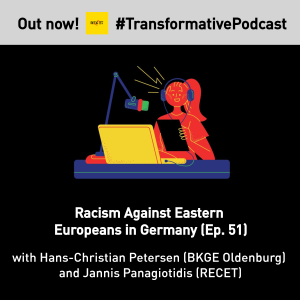
Wednesday May 29, 2024
Wednesday May 29, 2024
Is there such a thing as racism against people from Eastern Europe–people who in their majority would be considered "white" in terms of skin color? Drawing on historical and contemporary insights, in this episode RECET scientific director Jannis Panagiotidis and his co-author Hans-Christian Petersen discuss key findings of their new book Antiosteuropäischer Rassismus in Deutschland (Anti-East European Racism in Germany).
Hans-Christian Petersen is a researcher at the Federal Institute for Culture and History of Eastern Europe (BKGE) Oldenburg and a lecturer at the Carl von Ossietzky University of Oldenburg. His research interests include Russian-German history, the post-migrant present and the history of German “Ostforschung”. He is the author of An den Rändern der Stadt? Soziale Räume der Armen in St. Petersburg (1850-1914) (Böhlau 2019).
Jannis Panagiotidis is the Scientific Director of the Research Center for the History of Transformation. From 2014 until 2020, he was Junior Professor for Migration and Integration of Germans from Russia at the Osnabrück University Institute for Migration Research and Intercultural Studies (IMIS). At RECET, he works on a project investigating liberal global orders and freedom of movement and guides a research project on post-Soviet immigrant communities in Germany. He wrote the books: The Unchosen Ones. Diaspora, Nation, and Migration in Israel and Germany (Indiana UP, 2019) and Postsowjetische Migration in Deutschland: Eine Einführung (Beltz/Juventa, 2021).
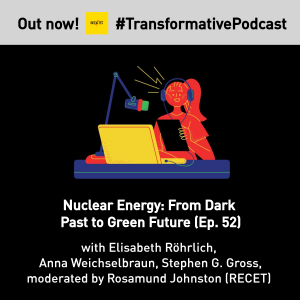
Wednesday Jun 19, 2024
Wednesday Jun 19, 2024
In this special edition of the RECET transformative podcast, we revisit the recent RECET festival, where speakers from around the globe discussed ‘Green Transformations.’ In this excerpt, three panelists charted the history of nuclear energy—from its ‘dark past’ to, perhaps, its ‘green future.’
Stephen Gross is the author of Energy and Power: Germany in the Age of Oil, Atoms and Climate Change (Oxford University Press, 2023). He was joined by Elisabeth Röhrlich, author of Inspectors for Peace: A History of the International Atomic Energy Agency (Johns Hopkins University Press, 2022). They spoke alongside Anna Weichselbraun, from the University of Vienna, who is currently finishing a manuscript on knowledge production at the International Atomic Energy Agency. The discussion was moderated by Rosamund Johnston (RECET).
Stephen G. Gross is Associate Professor of History and Director of the Center of European and Mediterranean Studies at New York University. After working at the Bureau of Economic Analysis (Department of Commerce) in Washington DC, he received his PhD in history from UC Berkeley. He is the author of Energy and Power: Germany in the Age of Oil, Atoms, and Climate Change (Oxford University Press, 2023) and Export Empire: German Soft Power in Southeastern Europe, 1890-1945, which explores the political economy of the Nazi Empire. His research has been supported by the Fulbright Fellowship, the German Academic Exchange Program, the Institute for New Economic Thinking, the Andrew Carnegie Foundation, and the Andrew Mellon New Directions Fellowship, through which he earned a certificate of sustainable finance at Columbia University.
Elisabeth Röhrlich is Associate Professor at the History Department of the University of Vienna and Vice Dean of the Faculty of Historical and Cultural Studies. Her expertise is in twentieth century global and international history, the history of international organizations, the history of the nuclear age and the Cold War, and Austrian contemporary history. She received her PhD in history from the University of Tübingen, Germany, and has held fellowships at the Norwegian Institute for Defense Studies, the German Historical Institute and the Woodrow Wilson International Center for Scholars (both in Washington D.C.), and Monash University South Africa. She is the author of a prize-winning book about the former Austrian chancellor Bruno Kreisky (Kreiskys Außenpolitik, Vienna University Press, 2009), and her writings on the history of the International Atomic Energy Agency (IAEA) have been published in journals such as the Diplomacy and Statecraft, Cold War History, and the Journal of Cold War Studies. Her monograph "Inspectors for Peace" on the history of the IAEA was published with Johns Hopkins University Press in 2022.
Anna Weichselbraun is a postdoc researcher at the Department of European Ethnology at the University of Vienna. She works at the intersection of historical anthropology of knowledge, semiotics and science and technology studies with an empirical focus on the global governance of technology in the long 20th century. She is currently revising her book manuscript on nuclear knowledge practices at the International Atomic Energy Agency.
Rosamund Johnston is the Principal Investigator of Linking Arms: Central Europe´s Weapons Industries, 1954-1994 at RECET. She is the author of Red Tape: Radio and Politics in Czechoslovakia, 1945-1969 which appeared with Stanford University Press in March 2024. Her research has been published in Central European History and a number of edited volumes. She has also written for the Journal of Cold War Studies, East Central Europe, Harvard Ukrainian Studies, Scottish newspaper The National, and public broadcaster Czech Radio. Johnston is the author of one book of public history, Havel in America: Interviews with American Intellectuals, Politicians, and Artists, released by Czech publisher Host in 2019.

Wednesday Jul 10, 2024
Making European Freedom of Movement (Madeleine Dungy)
Wednesday Jul 10, 2024
Wednesday Jul 10, 2024
Freedom movement just means removing migration barriers and letting people move around freely - or does it? In this episode, Madeleine Dungy of NTNU Trondheim discusses the complicated making of European free movement in the 1960s and 1970s with RECET scientific director Jannis Panagiotidis. At a time of reinforced national social welfare behind the border, she argues, governments, social actors, multilateral institutions, and NGOs had to work hard to reconcile the goals of broad regional mobility and deep social protection.
Madeleine Dungy is an Associate Professor at the Norwegian University of Science and Technology. She works on the history of international organizations, with a particular focus on trade and migration. She is the principal investigator of the ERC Starting Grant InternalFortress: Regulating European Freedom of Movement within the Nation-State, 1950-1980 and is the author of Order and Rivalry: Rewriting the Rules of International Trade after the First World War (Cambridge University Press, 2023).
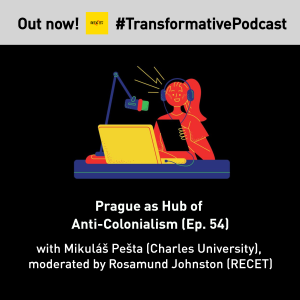
Wednesday Jul 31, 2024
Prague as Hub of Anti-Colonialism (Mikuláš Pešta)
Wednesday Jul 31, 2024
Wednesday Jul 31, 2024
Mikuláš Pešta works as an assistant professor at the Faculty of Arts, Charles University and as a researcher at the Institute of Contemporary History, Czech Academy of Science. He has published in the International History Review, the Journal of Contemporary History, Central European History, and Intelligence and National Security, as well as authoring both works of fiction and non-fiction in Czech. His research focuses on the contacts between Czechoslovakia and African and Asian countries and national liberation movements in the fields of education, cultural diplomacy, ideology, and the secret services. Currently, he is researching the role played by Prague-based international organizations and student internationalism during the Cold War and beyond.
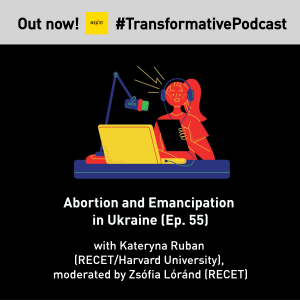
Wednesday Oct 02, 2024
Abortion and Emancipation in Ukraine (Kateryna Ruban)
Wednesday Oct 02, 2024
Wednesday Oct 02, 2024
In this episode, Kateryna Ruban talks with Zsófia Lóránd about how the history of abortion in Ukraine and Soviet Union can help us understand contemporary reproductive struggles and modern Ukrainian history. Kateryna’s future book tells a story of a female obstetrician-gynecologist in a postwar Transcarpathian hospital who performed abortions during Stalinism when abortion was illegal and later, showcases a doctor who insisted on professional autonomy despite the desire of political leaders to fully control the procedure. Abortion was a matter of intense public debates before 1917 and particularly in the 1920s, when many doctors argued that abortion was a part of female emancipation and a part of justified desire of women to regulate their reproduction. What happened next is usually seen as overwhelming Soviet pronatalism, but Kateryna shows a different picture of how women were able to maneuver within official policies and gain access to abortion. She focuses on Ukrainian and Transcarpathian contexts, thus departing from traditional portrayal of Soviet women as a whole and the Soviet history of abortion as based on central Russian archives.
Kateryna Ruban is a historian who received her Ph.D. from New York University in September 2022. In 2022-2023, she was a fellow at the Institute for European, Russian and Eurasian Studies at George Washington University. Earlier, Kateryna earned master’s degrees at Central European University in Hungary and at the National University of Kyiv-Mohyla Academy in Ukraine. She was a part of the Visual Culture Research Center in Kyiv. Kateryna Ruban was a Ukraine Fellow with RECET in 2024.
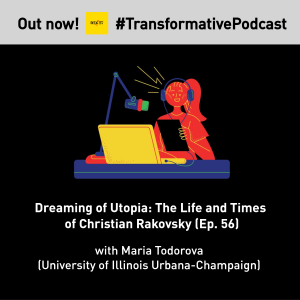
Wednesday Oct 23, 2024
Dreaming of Utopia: The Life and Times of Christian Rakovsky (Maria Todorova)
Wednesday Oct 23, 2024
Wednesday Oct 23, 2024
This podcast episode is partly a summary of the main points Prof. Todorova developed in her book "Imagining Utopia: The Lost World of Socialists at Europe's Margins", partly a chronological extension into the decades that were not covered by the book. This is done by focusing on the life and activities of Christian Rakovsky (1873-1941), as well as the assessments in the aftermath of his death. The change of the scales of analysis would allow Todorova to demonstrate the interplay between center and periphery, especially the "paradox" of socialism in agrarian societies and the attitude to the national question, the mechanisms of how socialist ideas were generated and received, and to emphasize the benefits of microhistory through the biographical method. The book ended with the demise of the Second International. In this talk, Todorova is taking the narrative further by stressing the activities of Rakovsky in the Soviet Union and particularly in the Ukraine, as well as his diplomatic work and his place in the Left Opposition. It thus highlights the move from the realm of the "utopia of the future" to the reality of "utopia on earth."
Maria Todorova is the Gutgsell Professor of History Emerita and Professor Emerita, Center for Advanced Study at University of Illinois Urbana-Champaign. She specializes in Eastern Europe, specifically the Balkans in the modern period. Her research focuses on historical demography, nationalism, socialism and post-communism.

Thursday Nov 14, 2024
Studying Land in Southeast Europe (Katarina Kušić)
Thursday Nov 14, 2024
Thursday Nov 14, 2024
How is land central to socialist and postsocialist transformations in Southeast Europe? In this episode, Katarina Kušić (University of Vienna) tells Jelena Đureinović (RECET) about land as more than an object of policy, the perspectives on studying it and the importance of rural areas and marginalised actors.
Dr. Katarina Kušić is a Marie-Skłodowska Curie Actions Postdoctoral Fellow at the Research Platform “Transformations and Eastern Europe” at the University of Vienna. Her current project investigates the relations that make and remake the meaning of land in political, social, ecological, and economic transformations, looking at policymaking, everyday experiences and alternative political imaginaries in Southeast Europe. The project is funded by the Marie Skłodowska-Curie Actions (MSCA) Postdoctoral Fellowship. Her book “Beyond International Intervention: Politics of Improvement in Serbia” is coming out with the University of Michigan Press in early 2025.
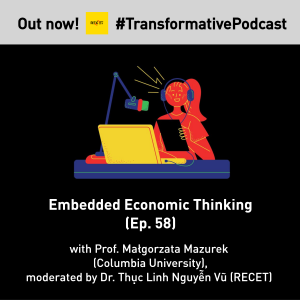
Wednesday Dec 04, 2024
Embedded Economic Thinking (Małgorzata Mazurek)
Wednesday Dec 04, 2024
Wednesday Dec 04, 2024
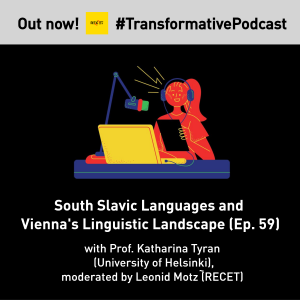
Wednesday Jan 15, 2025
South Slavic Languages and Vienna's Linguistic Landscape (Katharina Tyran)
Wednesday Jan 15, 2025
Wednesday Jan 15, 2025
Vienna’s walls are full of signs, stickers and graffitis in South Slavic languages. How does this come about? – In this episode, Leonid Motz (RECET) talks to Prof. Katharina Tyran (University of Helsinki) about Vienna’s linguistic landscape and how it is shaped by Post-Yugoslav migrants. What can we learn about power dynamics from the linguistic practices in which they engage? Tyran highlights how – often subversive or subcultural – linguistic signs are rooted in transnational cultural contexts that transcend the linguistic borders of the modern nation-state.
Katharina Tyran is an Associate Professor of Slavic Philology at the University of Helsinki, Finland. Her research focuses on South Slavic languages. Tyran’s interests include sociolinguistic topics with a focus on minority languages, language and identity, linguistic landscape research, language commodification, writing systems and orthography.
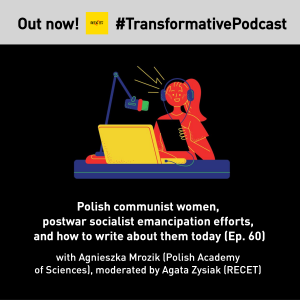
Wednesday Feb 05, 2025
Wednesday Feb 05, 2025
